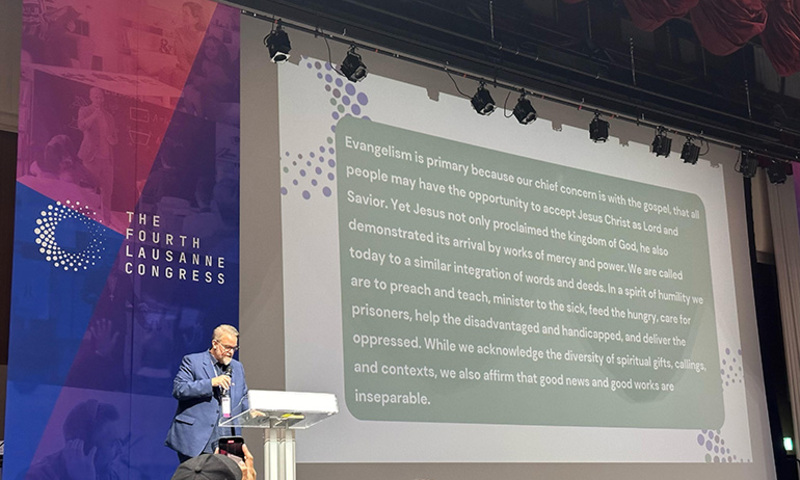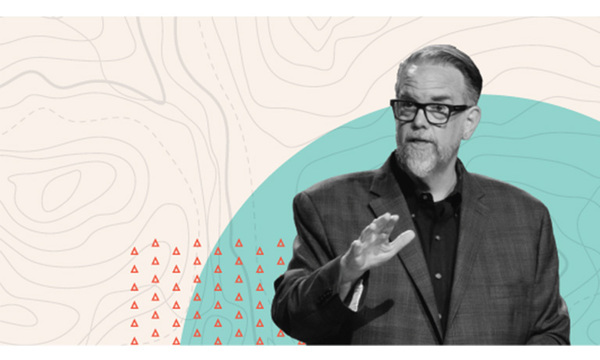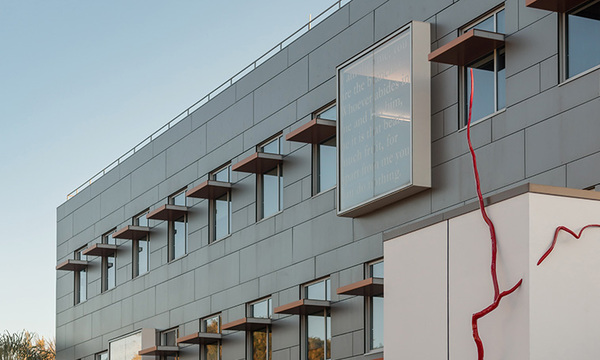Trees frame key themes in the biblical storyline. In the opening chapters of Creation, God placed two trees in the garden: the tree of life and the tree of the knowledge of good and evil (Gen. 2:9). In the closing chapters of Restoration, we see a doubled tree: “On each side of the river stood the tree of life, bearing twelve crops of fruit, yielding its fruit every month” (Rev. 22:2).
Trees also show up throughout the storyline between Creation and Restoration. Psalm 1, which introduces the entire Psalter, represents the life of the righteous person as a tree rooted (pun intended) in the Word of God. At the center of the story we find Redemption, which came through the death of Jesus Christ on a tree, the cross of death becoming for us a tree of life.
The metaphor of a tree aptly describes the role of Talbot School of Theology in global evangelicalism. From root to fruit, Talbot has played a crucial role in the evangelical world, a role that will continue to grow. Today evangelicalism needs our influence; we are poised to provide the growing kingdom impact needed. At Talbot our roots run deep, our branches spread wide, and we bear the fruit our world needs.
Our Evangelical Roots
Rooted in the Best of Evangelical History
In the fall of 1739, renowned evangelist George Whitefeld visited the town of Neshaminy in the colony of Pennsylvania. Only 24 years old, Whitefeld was already famous throughout Great Britain and the colonies. He came to Neshaminy because a Presbyterian leader named William Tennent had invited him there to preach. Though far lesser known than his younger guest, William Tennent was also a key figure in the First Great Awakening. Specifically, Tennent trained young men, including his sons, and these young men soon became influential revivalists. Whitefeld wrote of the academy Tennent started to train those youths for ministry. Some derisively called this initiative “the log college.” Yet Whitefeld observed:
The place wherein the young men study is now, in contempt, called the College. It is a log-house, about twenty feet long, and nearly as many broad; and to me, it seemed to resemble the school of the old prophets. From this despised place, seven or eight worthy ministers of Jesus have lately been sent forth; more are almost ready to be sent; and a foundation is now laying for the instruction of many others. (George H. Ingram, ““\The Story of the Log College,” Journal of the Presbyterian Historical Society (1901-1930), Vol. 12, No. 8 (October 1927), 496)
This “Log College” represented the value placed on education by those early evangelicals in the middle of the Great Awakening. Young men, like William Tennent’s son Gilbert, would leave this rustic structure and help lead the First Great Awakening. Many other schools would likewise be birthed with evangelical convictions, such as the College of New Jersey (now Princeton), where Jonathan Edwards was called as president in 1858 (although he only served two months before his death). Such early evangelical history of the United States undergirds the long history of higher education among evangelicals.
Rooted in Conservative Evangelism
Biola University and Talbot School of Theology flow from the historical stream of conservative evangelical theology. Our commitment to theological conservatism is unambiguously rooted in the inerrancy of Scripture and the saving gospel of Jesus Christ. Two words have guided Biola from its founding in 1908: Jesus Saves. The good news of the new birth was central to preachers from Whitefeld to Tennent to Wesley. We embrace the best of the Great Awakening’s multi-denominational roots. Whitefeld, for example, preached to Anglicans, Methodists, Presbyterians, impoverished coal miners and wealthy aristocrats. Talbot, too, embraces an interdenominational perspective that allows for a diversity of traditions, ideas, and wisdom — all embedded in evangelical faith.
Our Global Branches
Branches Reaching Across the Globe
Being theologically centered in conservative evangelicalism evangelical conviction. Our voice is needed in missionary means that we know who we are and we know where we movements like Lausanne and in theological circles like the are headed. We are part of a truly global faith, with influence expanding around the globe. I recently returned from Lausanne 4 in Seoul, where over 5,000 delegates committed to the fame of Jesus gathered from 200 nations. As the North American Regional Director of Lausanne, I see the long shadow of men like Billy Graham and John Stott cast across the evangelical church today.
Graham, Stott and others founded Lausanne to mobilize Christians for world evangelization. The Lausanne Movement aims to connect “influencers and ideas for global mission, with a vision of the gospel for every person, disciple-making churches for every people and place, Christ-like leaders for every church and sector, and kingdom impact in every sphere of society.” Lausanne responded to the conciliar movement and its missional drift from evangelical conviction and evangelistic concern. Even though they disagreed on the exact relationship of evangelism and societal transformation, Graham and Stott both worked for the purpose of global evangelization.
At Talbot, we focus on biblical thinking, spiritual transformation, and living and proclaiming the gospel. Each of these individually and all three together demonstrate our evangelical conviction. Our voice is needed in missionary movements like Lausanne and in theological circles like the Evangelical Theological Society. As I recently posted online, “Although Talbot is the fifth largest multi-denominational seminary in the world, last year we had more faculty present at ETS than any other seminary. Scholarship lives strong at Talbot.
Our Continuing Fruit
Trends in Theological Education
The 236 member schools of the Association of Theological Schools (ATS) saw a general decline from 2005 to 2014 but a more stable trend from 2015 to 2023. Of the 108 evangelical schools of the ATS, 47% saw an increase while 53% decreased. That's a better rate than the 80 mainline schools, which saw only 40% increase with 60% decreasing. But the evangelical schools are still not experiencing a thriving trend. Talbot is an exception to this downward trend.
In early October 2024, I celebrated some of our stats and growth on social media:
- Talbot has 1,726 students at the undergraduate and graduate levels.
- The B.A. in Bible, Theology, and Ministry (traditional undergrad) had a 14% increase from last year, with our largest incoming class in a decade.
- The B.S. in Bible, Theology, and Apologetics (online) grew by 36.6% from Fall 2023.
- Talbot’s graduate headcount enrollment is 1,449. (This is our seminary and other graduate programs.)
- Talbot’s incoming graduate class of about 400 is a 16% increase from Fall 2023 — also the largest incoming class in a decade.
Talbot is the fifth largest multi-denominational seminary in the world, something even many informed evangelicals don’t know. I was personally attracted to Talbot because it is rooted in a university context academically and grounded in conservative evangelical theology convictionally. Biola University is widely recognized, as it was named in U.S. News & World Report in the top tier of “Best National Universities,” among other achievements. Being integrated into the life of a university of excellence is a blessing for Talbot.
I want to help people know the story of Talbot and the opportunities we have to impact the world for Christ. We are located strategically both geographically and culturally. Our campus is on the Pacific Rim in Los Angeles, an area of truly global influence. Likewise, we live in a shifting cultural moment, and cultural trends come from the coast, in particular the West Coast in the U.S. As the church finds itself in an increasingly secularized environment, we sit on the front lines of cultural change. Those who study here can learn how to live with winsome conviction in society, to show and share Jesus in a broken world.
The Fruit of Forging an Evangelical Future
Talbot provides students with a world-class theological education. Yet, that’s not enough. We also have one of the most robust spiritual formation emphases found in any evangelical school. We don’t just want students to know the tools and have the knowledge — we want them to know God and be transformed by his work in their lives. Because of our conviction about the Word of God and the power of the gospel, Talbot is poised to face and respond to the challenges of today in at least four ways.
- Providing a Spiritual and Moral Compass in a Society Marked by Convulsion
Society is experiencing the largest cultural convulsion since the 1960s. Trust in institutions is low. We’ve seen the perfect storm for our convulsive times: accelerated change, a global pandemic, political mistrust and the erosion of institutions. We are having unprecedented conversations over gender identity and generational cultural division. But the cultural moment we are in does not pause the biblical mission we are on. It does magnify the need to provide the most effective theological and ministry training possible for those who lead churches in this moment.
- Providing a Transcendent Voice in the Current Evangelical Moment
Over the past few months, I’ve spent a lot of time across the English-speaking Western world, including a month in Australia, time in the U.K., and of course, here in the U.S. and Canada. In the English-speaking Western world, Christians are a little unsure about things now that they’ve found themselves on the other side of the cultural divide. In other words, what we hold to be true and scriptural the world might see as small-minded or intolerant. Western Christians aren’t used to being in that space. It’s happened over the last few decades, first in Europe and Australia, and now in North America. (Some of this section is adapted from Sean McDowell, Scott Rae and Ed Stetzer, “Do Christian Universities Still Matter?” Think Biblically: Conversations on Faith and Culture.)
We’ve lost the home-field advantage we enjoyed for a long time. As a result, Christians have somewhat lost their footing. For example, while we are now at odds with culture on such issues as marriage and gender, we are simultaneously seeing a historically low ebb of evangelistic engagement.
Just 30 years ago, people were going to Evangelism Explosion classes for training in their churches on how to share their faith (along with a host of other tools). Today, when I hear someone talk about evangelism, it’s almost always in the context of pointing out how people did it badly rather than how we might do it rightly. We have to ask: How do we help Christians regain a solid footing in a rapidly shifting culture? How do we help them regain confidence in the gospel and their Christian witness? Many Christians and churches have not done well with this. At Talbot, we have a world-renowned focus on apologetics, which helps to disciple Christians to be confident in their faith while giving them tools for sharing it with others. I was recently at the Oxford Center for Christian Apologetics where they told me the number one apologetics program in the world is at Biola and Talbot.
I came to Biola and Talbot because I appreciate the language used by President Barry Corey about having a firm center of conviction with soft edges of compassion. I think this resonates well for the church today. Many Christians right now approach culture like going into war, but I don’t think you can wage war against the world and reach the world at the same time. How do we stand out? How do we remain faithful on what are really difficult issues? Talbot can lead in these matters.
In the area where Christians live and serve God — in places like the U.K. or Australia, or California or Illinois, and increasingly in places like Nashville — we can be encouraged that the ideas driving the cultural shift are actually collapsing in on themselves. They are not working. The whole modern experiment is failing. We must remember the growth of secular contexts doesn’t mean the gospel can’t still be advancing.
At Biola and Talbot we have an incredible opportunity to see students come to a Christian university and graduate school, learning how their worldview lines up with Scripture. I love the 30 credits of biblical studies required in the undergraduate programs here at Biola, challenging students to be rich in the Scriptures and to engage in theological understanding.
Christian theological education in some contexts has raced to the bottom: “Let’s make it as easy, as short and as accessible as possible.” I’m for accessibility and affordability. But I don’t want to join the race to the bottom to expect the least possible from students. I’m passionate about the robust theological education provided at Talbot. - Providing theological and ministry education that balances unchanging truth with creative ways to train students.
Evangelicalism has stood with a strong conviction about unchanging truth and the spread of the gospel, while at the same time being open to creative and new ways to proclaim that truth. George Whitefeld, called by some the first evangelical (or at least the first famous evangelical), frustrated the established church in England when he started preaching in the fields to the colliers (coal miners). His contemporary John Wesley had the audacity to publish his sermons and a myriad of tracts, along with developing a remarkable small group approach that culminated in the birth of the Methodist Church. From the Great Awakening preachers to the technological advancements used by Billy Graham, balancing the timeless and the timely has been a tightrope most evangelicals have been willing to walk.
Education will continually push the boundaries of technology to help students learn and grow in ways that fit our rapidly changing world and the realities of the information age. An ATS study showed that 80% of students were on campus in 2006–07, while 44% of students were online a decade later.
Someone with an online experience at the Talbot School of Theology engages with our professors through a community in the digital space. We have asynchronous experiences that happen on students’ own schedules, but we combine them with synchronous experiences as well.
Our vision includes establishing strategic partnerships through denominations, networks and local churches. We will share more soon about launching modular and hybrid programs. For instance, maybe a student lives in a city in the Midwest. We can offer a class in that location each year, some online, and some in a hybrid format where students come to our Southern California campus. After all, there is nothing like walking the Biola campus in January for a student flying in from Minnesota!
We will also develop increasing partnerships through the multitude of networks forming today. Leaders are forming teams composed of churches from a variety of denominations or the rapidly growing nondenominational church population. Like-minded churches –– maybe 10, maybe 50 –– come together to form networks and share ideas, developing affinities in one or more area. We can provide training and leadership in such contexts. - Providing theological and ministry training for an increasingly diverse population ethnically and generationally.
At Talbot we developed a strong statement about diversity (biola.edu/about/diversity). Ten years ago Juan Martinez wrote “It’s Already 2040 at a Seminary Near You,” based on the U.S. Census Bureau prediction that sometime during the 2040s Americas white population will move from being the majority population to the largest of several large ethnic-racial groups. We want to be leaders in equipping leaders for the coming generations.
We’re already leaning into the new reality, as we demonstrate a remarkably diverse student body across all of our Talbot programs:
37%: White
18%: Asian
11%: Hispanic
17%: International
17%: Other
Nearly 1 in 5 students enrolls from outside of America, and we are planning to significantly ramp up our international presence in the next year. And, no one is a majority at Talbot. This diversity positions us well for the current and future realities of our culture, as it also mirrors the vision of the people of God from the nations around the throne (Rev. 5:9, 7:9).
Student populations are also trending older. ATS reported that the number of students in their 20s declined 12% from 2006 to 2016, while students over 50 increased 6%, and those in their 30s by 3%.
We have to think of ways to deliver theological education to those who are older but who deeply desire that kind of education. Such students have mortgages and full-time careers, but they seek to grow in their knowledge as they will likely transition to a full-time or at least some form of bivocational ministry. In many cases they are more reluctant to uproot their family and move to a seminary campus for the education they seek. So we have an opportunity to faithfully and creatively offer training and education to them.
Conclusion
Evangelical schools should be the primary exemplars of conviction about God’s Word and excellence in training leaders. I believe Talbot’s reach is already profound, but in the days to come we can see further growth and fruit for the glory of God. We are a tree planted by the streams of God’s grace, rooted in evangelical history, branching across the church globally and bearing fruit, Lord willing, for eternity.
 Biola University
Biola University



.jpg)